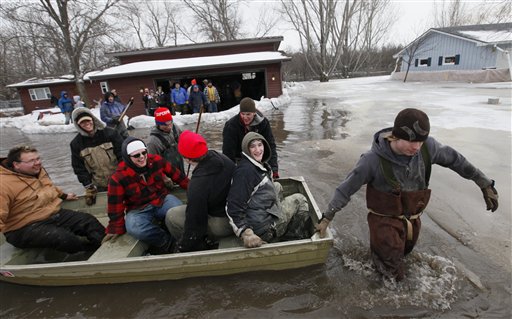In an interview with reporters last week, President Barack Obama correctly raised the point that global warming could lead to more severe flooding events in the future. Although it’s impossible to link a specific event to global climate change – as Obama was careful not to do – the record-breaking flooding of the Red River in Fargo, North Dakota is consistent with the trend towards increased frequency and severity of extreme precipitation events predicted by the climate science community.
“I actually think the science around climate change is real. It is potentially devastating,” Obama told the reporters. “If you look at the flooding that’s going on right now in North Dakota and you say to yourself, ‘If you see an increase of two degrees, what does that do, in terms of the situation there?’ That indicates the degree to which we have to take this seriously.“
But not a single reporter – in the meeting or otherwise – made that critical point in all the Fargo flood coverage over the past week.
Joe Romm writes on Climate Progress that “you’ll have to look very hard to find a single story in the mainstream media that even mentions climate change (other than the few quoting our President) — even though the record “once-in-a-hundred-year flooding” the Midwest now seems to be getting every few years or so is precisely what scientists have been expecting from the warming.”
Romm’s post at ClimateProgress.org details the science behind the predictions of more extreme flooding events, providing documentation and explanation that even the laziest reporter could understand. If any of them ever took the time to read it, that is.
Romm adds the necessary caveat that reporters shouldn’t go hog wild and “link every extreme weather event” to global warming. That’s not the point, although the deniers will say it is ad nauseum.
The take-home message for responsible reporters is that “when we have ‘worst on record’ type events, or 100-year floods — and especially ones that last more than a day and hit a broad area — then I think the reporter has an obligation to include the issue [of global warming],” Romm writes.
When will reporters begin to oblige?
Subscribe to our newsletter
Stay up to date with DeSmog news and alerts







